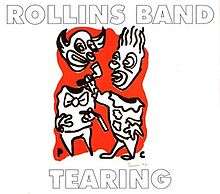
Tearing
Tearing is the act of breaking apart a material by force, without the aid of a cutting tool. A tear in a piece of paper, fabric, or some other similar object may be the result of the intentional effort with one's bare hands, or be accidental. Unlike a cut, which is generally on a straight or patterned line controlled by a tool such as scissors, a tear is generally uneven and, for the most part, unplanned. An exception is a tear along a perforated line, as found on a roll of toilet paper or paper towels, which has been previously partially cut, so the effort of tearing will probably produce a straight line.
Materials vary in their susceptibility to tearing. Some materials may be quite resistant to tearing when they are in their full form, but when a small cut or tear is made, the material becomes compromised, and the effort needed to continue tearing along that line becomes less.
Materials can be characterized by standard methods to measure their 'tear strength'. There are several applicable standards which vary around the world. The variables which affect the tear strength can be summarized neatly by the quote:

Tearing (song)
"Tearing" is a song by the American punk rock band Rollins Band.
CD single track listing
Charts
References
Primary
Primary may refer to:
Arts and culture
Computing
Mathematics
Politics
Science and mechanics
Primary election
A primary election is an election that narrows the field of candidates before an election for office. Primary elections are one means by which a political party or a political alliance nominates candidates for an upcoming general election or by-election.
Primaries are common in the United States, where their origins are traced to the progressive movement to take the power of candidate nomination from party leaders to the people.
Other methods of selecting candidates include caucuses, conventions, and nomination meetings. Historically, Canadian political parties chose their candidates through nominating conventions held by constituency riding associations. Canadian party leaders are elected at leadership conventions, although some parties have abandoned this practice in favor of one member, one vote systems.
Types
General
Where primary elections are organized by parties, not the administration, two types of primaries can generally be distinguished:

Primary (film)
Primary is a 1960 Direct Cinema documentary film about the 1960 Wisconsin Primary election between John F. Kennedy and Hubert Humphrey for the United States Democratic Party nomination for President of the United States.
Produced by Robert Drew, shot by Richard Leacock and Albert Maysles, and edited by D. A. Pennebaker, the film was a breakthrough in documentary film style. Most importantly, through the use of mobile cameras and lighter sound equipment, the filmmakers were able to follow the candidates as they wound their way through cheering crowds, cram with them into crowded hotel rooms, and to hover around their faces as they awaited polling results. This resulted in a greater intimacy than was possible with the older, more classical techniques of documentary filmmaking; and it established what has since become the standard style of video reporting.
In 1990, this film was selected for preservation in the United States National Film Registry by the Library of Congress as being "culturally, historically, or aesthetically significant". The film's importance in the evolution of documentary filmmaking was explored in the film Cinéma Vérité: Defining the Moment.
Podcasts:

-
by Killed By Butterfly
Tearing Me
by: Killed By ButterflyShould I die in your hand?
When the feeling becoming stronger
The dream of having you
Won't go, now haunting me
Looking back at what we had
I guess it's worth trying
Why?!
Why can't I have you back?
....... I'm waiting....
You left me waiting
Hurt, guilt, pain filled me
As a slight tear
